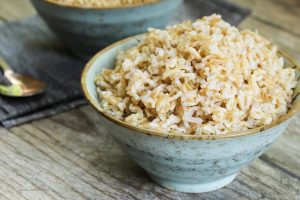The FDA has just released a report on its investigation into arsenic in rice. We told you about this issue this past spring, when questions surfaced about brown rice syrup used in some baby formulas and in products such as granola bars. Nature’s One, a baby food manufacturer, has announced a goal for zero arsenic in baby formula.
 Brown rice syrup is often used as a substitute for high fructose corn syrup as a sweetener in processed foods. Rice naturally contains arsenic because it absorbs it as it grows. Most rice is grown on former cotton fields, where arsenic was used as a pesticide before government regulations banned it. Arsenic is a heavy metal that stays in soil for decades.
Brown rice syrup is often used as a substitute for high fructose corn syrup as a sweetener in processed foods. Rice naturally contains arsenic because it absorbs it as it grows. Most rice is grown on former cotton fields, where arsenic was used as a pesticide before government regulations banned it. Arsenic is a heavy metal that stays in soil for decades.
Inorganic arsenic is the dangerous form of the metal, classified as a Group A human carcinogen. The EPA has a daily limit of 10 μgrams/liter in drinking water, but there is no standard for food. People who eat more than 10 tablespoons of uncooked rice per day of rice that has high arsenic levels could consume more arsenic than drinking water standards.
In the report, the FDA states that they analyzed 200 samples of rice and rice products and is preparing to sample 1,000 more. The products sampled include cereals, rice beverages, nd rice cakes. Arsenic levels vary tremendously, but the average amount found in some products is substantial. Rice (other than basmati) has 6.7 micrograms per 1 cup cooked. Rice cakes has 5.4 micrograms (μgrams) per 2 cakes. Rice beverages have 3.8 μgrams per 240 ml. Rice cereals have 3.7 μgrams per cup, and basmati rice has 3.5 μgrams per 1 cup cooked.
The FDA is not recommending at this time that consumers change their consumption of rice and rice products. But they do recommend that people eat a wide variety of grains as part of a balanced diet. When the remaining 1,000 samples are analyzed, the government will decide whether or not to issue additional recommendations.
Michael R. Taylor, FDA’s deputy commissioner for foods, said, “it is critical to not get ahead of the science. The FDA’s ongoing data collection and other assessments will give us a solid scientific basis for determining what steps are needed to reduce exposure to arsenic in rice and rice products.”
FDA Commissioner Margaret Hamburg said that a balanced diet encompassing a wide variety of foods is important for good health and to minimize any “potential consequences from consuming any one particular food.” She also stated that “FDA is committed to ensuring that we understand the extent to which substances are present in our foods, what risks they may pose, whether these risks can be minimized, and sharing what we know.”




